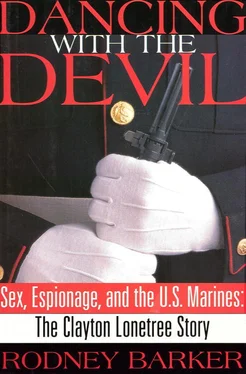For Violetta, this was a strictly pragmatic choice. It would have been impossible for a woman of her background to advance to higher levels in society on merit alone. That was the nature of Soviet society: If you wanted to better yourself and improve your lot, and your parents weren’t wealthy or influential party members, you had no choice but to seek favors. In this instance that meant cooperate with the system. It wasn’t a matter of morality, but expediency. And it wasn’t as if she were alone in playing the game. Many of the students she would be informing on had gotten where they were because of privileges.
Over the next three years Violetta established herself as disciplined and competent in all the assignments that were put before her. She was not a particularly popular student. Ever since her mother’s second marriage she had adopted a guarded stance toward people, and as a fellow student would describe her, “Violetta was a person without half-tones: She either loved or hated, and if she loved someone she would do anything for them, but if she hated she could be cruel. Others, similarly, either loved her or hated her.” But at the institute she would find several close friends with whom she would bond for life, and she would accomplish the goal she’d set for herself, graduating from the Pedagogical Department in 1982.
It was during the fourth and final year at the institute that the “servants of intelligence” began trolling the waters in search of recruitable prospects. After observing and appraising Violetta, they decided she would make an excellent candidate for future projects. She was maturing into a beautiful woman, she had a strong desire to promote her career, and she had a proven ability to perform “Judas functions.” They rewarded her with the invitation to take a two-year postgraduate course at the Ministry of Foreign Affairs that would prepare her for a position in a foreign embassy, and she accepted.
Once again, it was not a difficult choice for her to make, in part because of the personality of the people who approached her—contrary to popular impressions of KGB officers as scheming and base men, those she met were sophisticated, charming graduates of the institute—and in part because of Violetta’s outlook. She’d gotten a taste of the privileged life, and she knew that if she continued to cooperate, all kinds of paths could open to her that would provide her with a measure of liberty and gaiety absent from normal Soviet life.
Although the KGB did have “charm schools” where young women were taught seduction techniques, the purpose of the course that Violetta attended at the Foreign Ministry was to polish social skills. This meant raising her general level of cultural awareness so she would be able to conduct conversations on different topics and on different levels with well-educated foreigners. She was also taught the behavior, manners, and etiquette appropriate to a diplomatic setting. While the effective application of cosmetics was one of the lessons, the teachers stressed that too much makeup would create suspicions, and there were ways to be sexy at deeper levels. Western men in particular tended to be drawn toward “soulful” relationships with women who projected interesting inner qualities; women who asked intelligent questions, were willing to listen, and showed an interest in them as people. As for engaging in sexual activity, she was never explicitly told that would be a requirement, but it was implicit that there were circumstances under which that was the direction a relationship might go.
There was no specific training on intelligence issues—nothing more specific than things like the value of not showing how well she understood the English language at first—but there was no misunderstanding either: She was being groomed to become a more efficient informer.
Throughout this training Violetta continued to work part-time in the administrative offices of the institute and to teach English on a freelance basis. She also served as an interpreter at different international congresses that were held in Moscow, and in the spring of 1985 she was recommended for employment at the Administration for Service to the Diplomatic Corps. Known by the initials UPDK, and pronounced Ooh-Pay-De-Kah, it was the Soviet agency that provided a Russian workforce to every foreign embassy.
At this time in the Soviet Union the tentacles of the KGB reached into just about every organization, but its interest in UPDK was greater than most others because of the contact the members of UPDK had with foreigners. While a certain percentage of the UPDK staff at every embassy was professionally trained by the KGB, the majority owed their position to family connections. Every Russian who worked for UPDK was screened for “political correctness,” however, and all were required to meet with a supervisor on a weekly basis and report their observations. Everyone also knew that the time could come when he or she would be called upon to serve the security services in an active capacity.
When Violetta was informed in May 1985 that she was being recommended for a position in the American Embassy, she had mixed feelings. It made her nervous, because throughout her life it had been stamped into her head that America was the enemy and the American Embassy was staffed with professional spies. Indeed, at that very time she, like millions of Russians, had been transfixed by a popular espionage thriller series on Soviet television that pitted the KGB against the CIA. A James Bond-style adventure that starred some of the Soviet Union’s top movie actors, the program focused on a fictitious African republic with a pro-Moscow government that appealed to Soviet help to quell a CIA-backed coup plot, and the action included bloody assassinations, clandestine agents shadowing U.S. diplomats in Moscow, and codes transmitted by U.S. spy centers via shortwave receivers. Like many Soviet films, this one had a clear message: The United States was plotting not only against the Soviet Union, but also against nations friendly to it—and foreigners were not to be trusted.
On the other hand the embassy position was an exciting opportunity to meet and interact with Westerners; the salary was more lucrative than at any of the other foreign embassies; and she was told that Russian employees were even given a uniform allowance. A pittance by Western standards—$300 a year—but the right to flip through Neiman Marcus, Macy’s, and Sears catalogues and order things that were impossible to get in the Soviet Union was a big perquisite.
As it turned out, Violetta’s first position was not in the embassy proper but as a temporary replacement in Spaso House, the residence of the American ambassador to the Soviet Union, Arthur Hartman. She acted as sort of the house executive, sitting at a desk, answering the phone, and communicating with the domestic staff, but worked there barely a month before she was relieved of her duties because of a conflict with Donna Hartman, the ambassador’s wife, who found her sulky and uninterested in her work, and rated her performance as unsatisfactory.
Within a matter of weeks she was hired to fill a long-standing vacancy in the customs section of the American Embassy as a file clerk. She almost didn’t get the job because of what had happened at Spaso House, but UPDK advised the embassy that she was the only person available, her English was fine, and her clerical skills good enough. In her interview with the American General Services officer she projected a desire to prove herself worthy of a second chance.
Over the course of the summer of 1985 Violetta became “a stylish presence” at the embassy, in the words of one foreign-service employee. Her father, now a party boss, had reentered her life, and as if to make up for the years he’d been away, he bought her new outfits, so her attire was fashionably up-to-date. Dressed to kill, tall at about five feet nine inches, with shoulder-length brown hair and striking hazel eyes, she became the center of attention among male staff members at the embassy.
Читать дальше












